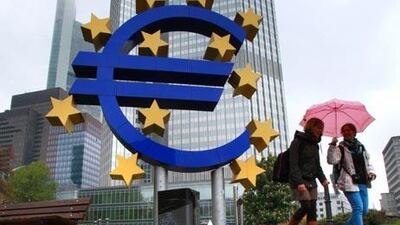Gulf industrial exports to the EU could be hit by the crisis in the euro zone, which threatens to choke demand for metals and petrochemicals from the region's industrial giants. The euro's slide against the US dollar, to which five of the six GCC currencies are pegged, has pushed up the price of exports from GCC states. The euro has hit its lowest level since the collapse of Lehman Brothers in September 2008, even after policymakers last week unveiled a US$1 trillion (Dh3.67tn) aid package to try to contain a sovereign debt crisis. Sluggish growth prospects for European countries are also likely to dampen demand for the region's non-oil products.
The falling euro pushed Saudi Arabia's Tadawul down 2.3 per cent yesterday, with the biggest declines registered by petrochemical makers including Saudi Basic Industries Corporation, Yanbu and Saudi Kayan. "Industrials are likely to see a fall in sales to Europe as the falling euro makes the Gulf less competitive when selling into European markets," said Mark McFarland, the emerging markets economist at Emirates NBD.
The outlook for the euro remained "bleak", BNP Paribas said last week, with the bank expecting the currency to extend this year's almost 9 per cent slide against the dollar. Lingering concerns about the risk of contagion of the Greek debt crisis has prompted ratings agencies to warn of the harmful effects of the situation on other southern European countries. The UAE is focused on diversifying its export base away from oil, as it looks to develop its non-hydrocarbon economy. Aluminium, steel and petrochemicals are among the industries receiving investment to try to increase exports.
Exports from the GCC to the 27-member EU were valued at €21.7 billion (Dh98.5bn) last year. Oil made up the bulk of goods exported, along with petrochemicals, aluminium and other goods such as live animals and beverages. About €68bn in goods headed in the opposite direction, from the EU to Gulf states last year. Any shrinkage of the EU market could accelerate a general trend towards a decline in the importance of the region compared with fast-emerging markets.
"The EU certainly won't be the fastest growing market for this region as real economic growth in Europe will remain slow this year," said Roy Batchelor, the professor of banking and finance at Cass Business School in the UK. "The great advantage for the Gulf is that it sits between eastern Europe, North Africa and India and China, where growth will be faster." Meanwhile, retailers and logistics companies in GCC states importing from the euro zone are likely to benefit from the low value of the euro.
A long-awaited free trade agreement between the two economic blocs is close to being finalised by officials, which would help to eliminate tariffs on goods and services. Aluminium is a key topic for the GCC in the trade discussions as its exports of the metal to the EU are hit by a 6 per cent import duty. UAE officials have said they would look to push through the agreement during the Emirates's presidency of the GCC next year.
Talks between the EU and the GCC broke down last year after almost two decades of intermittent negotiations, partly because of duties the GCC wanted to impose on a number of goods, which the EU maintained were at odds with the intention to liberalise trade. The UAE, Saudi Arabia, Bahrain, Qatar and Oman all peg their currencies to the dollar. Kuwait uses a basket of currencies. tarnold@thenational.ae

